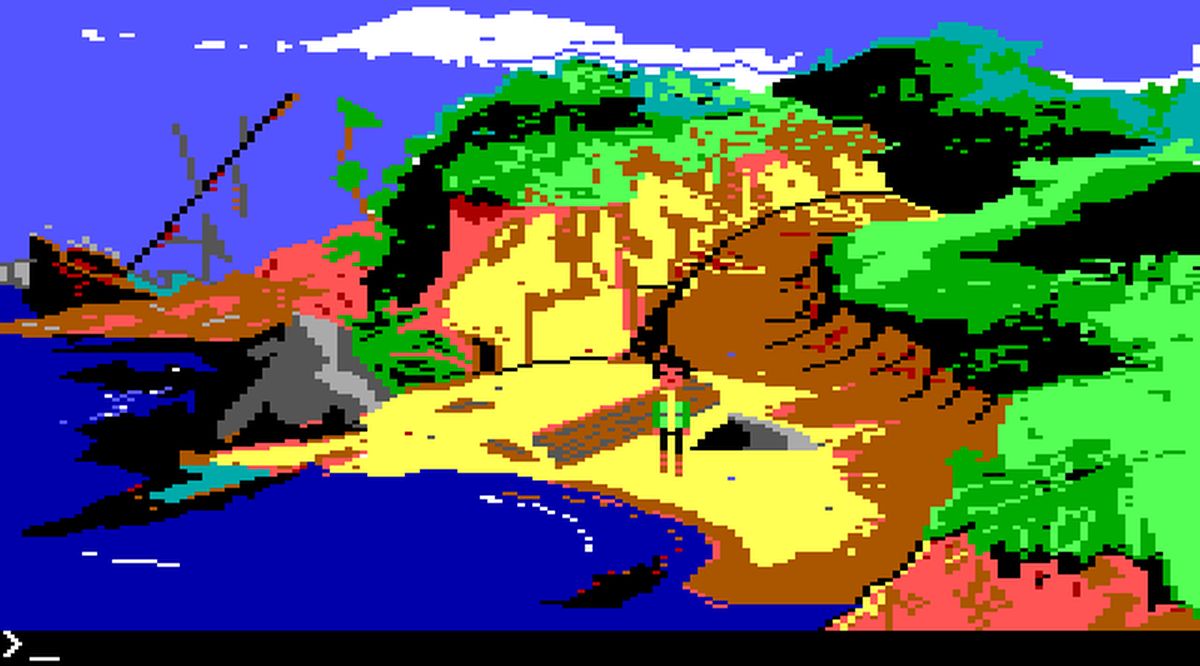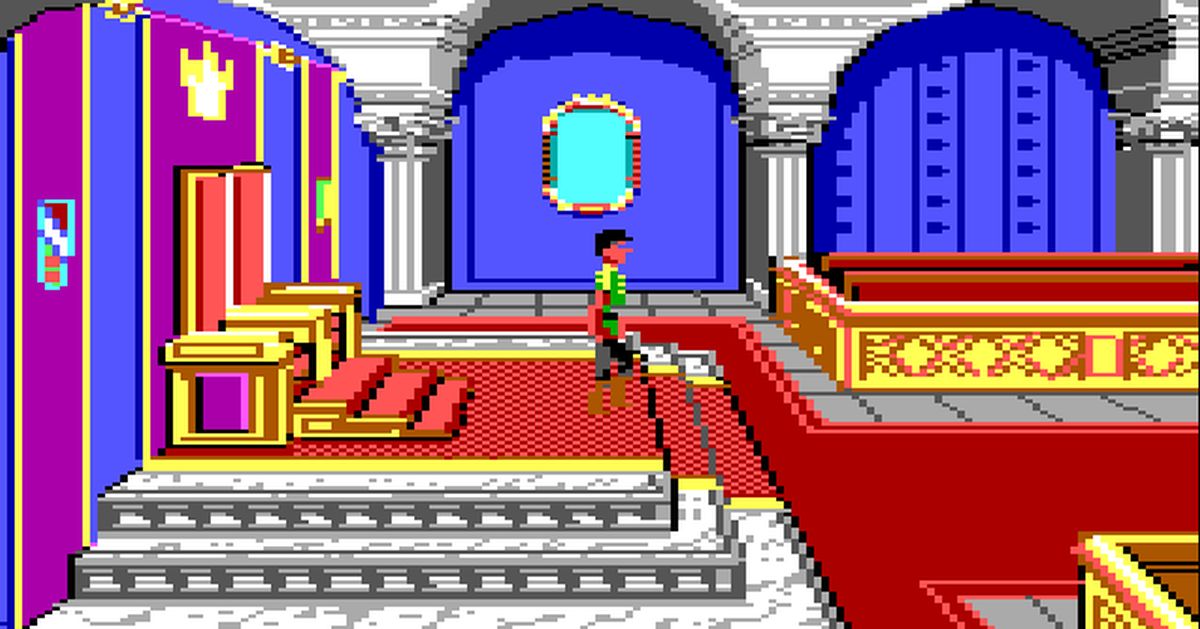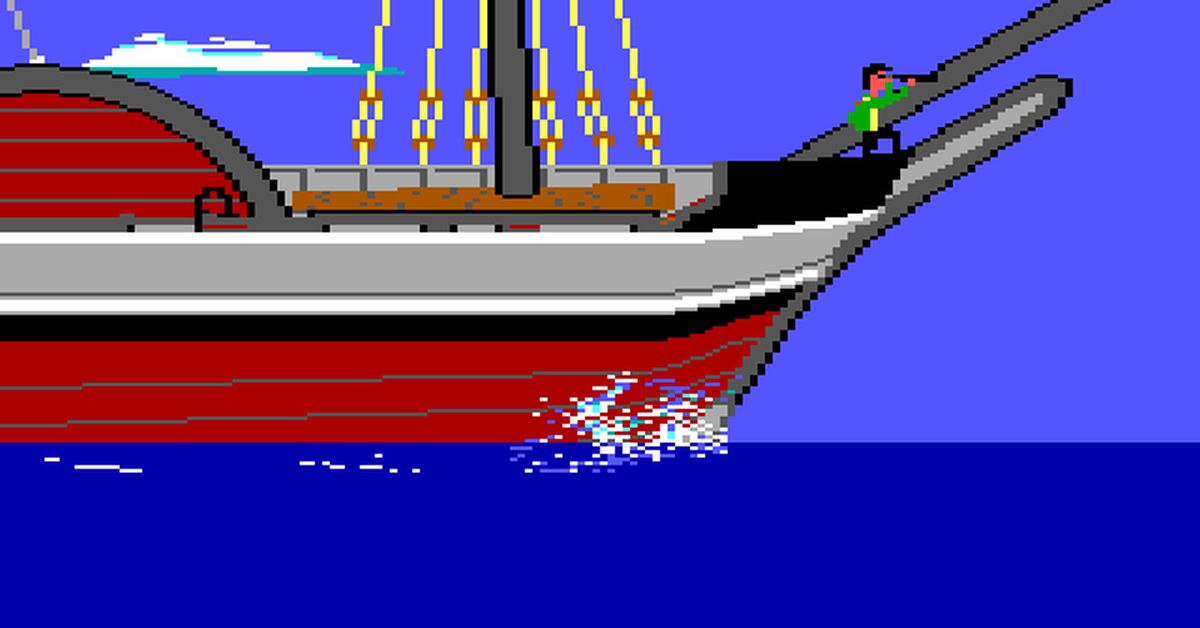This demake of King's Quest 6 has been 18 years in the making
It's the work of a dedicated fan named Brandon Kouri.

In the early 1980s, Sierra was at the forefront of the move from text adventures to adventures of the graphical kind—first with Mystery House, and later a string of games made in the studio's own Adventure Game Interpreter, like the first King's Quest and its immediate sequels. AGI allowed for sound effects, music, and 16-color vector graphics, depicting protagonists who moved around scenes with the arrow keys. You still had to type "lift plank" and "get ring" to interact with things, but you had something nice to look at in addition to the paragraph of text you'd get by typing "look" in each new location.
AGI's heyday lasted until 1988 when it was replaced by the Sierra Creative Interpreter, an updated scripting language that would eventually allow for hundreds of colors and digitized voice in games like King's Quest 6. Generally considered the best of the series, King's Quest 6 does still have a few dead ends you won't immediately know you've blundered into by not talking to a certain person or picking up the right object at the right time—an unfortunate hallmark of the series—but there are less of them overall. If you fondly remember one King's Quest game from your youth, this is probably the one.
Brandon Kouri's introduction to videogames were King's Quest 5 through 7, as well as Myst, which he played with his dad and sister. It was only when he decided to go back to the series' beginnings that he saw AGI with its distinctively large pixels and power-walking characters. "I was enthralled by it," Kouri says. "Something about it really sparked something in me, and I wanted to know everything about it and how it worked."
There's definitely a different vibe to each era of the adventure game. When I replay Quest for Glory: So You Want to Be a Hero I'm as likely to go back to the EGA original as the VGA remake—not just for the simpler graphics, but for the increased options a parser interface gives over more modern pointing and clicking. Trying to figure out the right phrase to type to perform an action makes you feel more present and engaged than clicking on everything you can see until something happens.
When Kouri discovered community tools used by fans to make their own games in AGI, he tinkered with small projects like his own version of Oregon Trail before wondering what King's Quest 6 would look like had it been made in the older scripting language. When he began, he had no way of knowing it would become an 18-year-long project.
"Of course I did not work every day solid for 18 years on this," Kouri says. "There were times where I would work feverishly for an extended period, and other times where it would lay dormant. Progress was slow and time-consuming. Often, I could not find motivation to work on it. I would become tired of the low-resolution graphics, and the typing interface. Trying to figure out all the things a player would type gave me fits. KQ6 is really not suited for the AGI system, so the strain on the memory was a major obstacle."

Whenever Kouri's motivation flagged, he went back to his favorite AGI game, Mixed-Up Mother Goose, which does for nursery rhymes what King's Quest 6 does for stories like the Arabian Nights, Alice in Wonderland, and Beauty and The Beast—mashing them up in a modern retelling. "I think [Roberta] Williams' voice shines clearly and beautifully throughout it. I just think it's absolutely gorgeous, and a beautiful piece of AGI engineering."
Keep up to date with the most important stories and the best deals, as picked by the PC Gamer team.
The other thing Kouri didn't know when he started working on his demake of King's Quest 6 was that other players would be interested in it. He was several years into the project before he uploaded a video of his progress to YouTube. "I was surprised by a small group of very passionate people who demanded that it be finished and released," he says. "Would never have guessed."
At the time, his work was on "a disassembled computer in a closet 1,500 miles away from me." But those ardent YouTube commenters inspired him to dig it out, and then continue his work during the pandemic. In 2024, 18 years after he began, he finally finished and released it as a free download on kq6agi.com. It quickly began doing the rounds on forums, YouTube, and Reddit. "I'm not connected to the gaming world or retrogamers," Kouri says. "Within a couple days of releasing the game, I have seen people playing it on the Nintendo DSi, Game Boy Advance, old Tandy computers, and Hercules monochrome displays. I had absolutely no idea this community existed."

The King's Quest 6 demake is a glimpse into an alternate timeline where Roberta Williams and Jane Jensen made the highlight of the King's Quest series with a quarter of the pixels, no voice acting, a soundtrack of bleeps, and a text parser. It's a fascinating artifact, letting fans of the original see it again with new eyes.
"I guess a personal 'pie in the sky' dream of mine would be that the Williams' and Jane Jensen knew about this game," Kouri says. "However, I would hope that they would appreciate it. I feel a little weird making something based on someone else's intellectual property. I am reminded of a scene from Julie & Julia, where Julia Child is upset at Julie Powell for making all the recipes in her cookbook."
So what would Kouri say if he could tell the creators of King's Quest 6 about his love letter to their work? "I would say this: 'Thank you for my childhood. Thank you for the emotions of joy and wonder that continue to stir my imagination to this day. I present this game to you as a gift. It is my gift to you.'"

Jody's first computer was a Commodore 64, so he remembers having to use a code wheel to play Pool of Radiance. A former music journalist who interviewed everyone from Giorgio Moroder to Trent Reznor, Jody also co-hosted Australia's first radio show about videogames, Zed Games. He's written for Rock Paper Shotgun, The Big Issue, GamesRadar, Zam, Glixel, Five Out of Ten Magazine, and Playboy.com, whose cheques with the bunny logo made for fun conversations at the bank. Jody's first article for PC Gamer was about the audio of Alien Isolation, published in 2015, and since then he's written about why Silent Hill belongs on PC, why Recettear: An Item Shop's Tale is the best fantasy shopkeeper tycoon game, and how weird Lost Ark can get. Jody edited PC Gamer Indie from 2017 to 2018, and he eventually lived up to his promise to play every Warhammer videogame.
- Rich StantonSenior Editor

